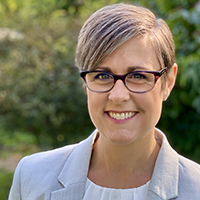SHEEO today joined forces with dozens of higher education and student success organizations to announce a “Shared Commitment” to make “Democracy Learning a Top Priority for Postsecondary Education.”
Democracy faces monumental challenges in the U.S. and world-wide. And in this pivotal era, “Shared Commitment’ calls on the higher education community to take concerted action to help build Americans’ readiness to tackle urgent public problems, together.
Urging “equity-committed civic learning,” the “Shared Commitment” signatories call for civic inquiry, practice in civil discourse, and collaborative work on real-world public problems to be part of each postsecondary student’s educational pathway.
“We celebrate the state systems—Maryland, Massachusetts, and Virginia—that already are making civic learning a higher education priority, said Robert Anderson, SHEEO’s President. “But in the spirit of the nation’s founders, all educators need to advance civic learning as an indispensable asset to a creative democracy.”
The Shared Commitment pledge was organized by the Civic Learning and Democracy Engagement (CLDE). Founded by the Association of American Colleges and Universities (AAC&U), the State Higher Education Executive Officers Association (SHEEO), Complete College America (CCA) and College Promise, CLDE is working in partnership with civic learning organizations and initiatives across the U.S.
CLDE builds from the revival of civic learning already spreading across K-12 and hundreds of postsecondary institutions, spurred by the work of many educational organizations that endorsed the Shared Commitment statement.
“These efforts are a strong beginning, but much more is needed to make democracy learning expected, rather than possible, for postsecondary students,” said leaders of the organizations that joined the “Shared Commitment“ pledge.
The problem, say CLDE leaders, is that students from underserved communities are often the least likely to take part in programs and courses that help engage them with urgent public problems.
CLDE seeks to expand the national debate from its insufficient focus on skills and short-term training to a larger concern with all college students’ civic, historical, global, and intercultural knowledge, and students’ active work on pressing public problems.
“Shared Commitment” signatories include the Higher Learning Commission which, in 2020, made civic engagement a criterion for the 967 institutions it accredits. Further, three signatory state systems recently launched comprehensive initiatives to advance civic learning for all students in their public community colleges and universities.
Other signatories are working in private higher education, in public and private consortia, and in active and ongoing partnerships between universities and community-based organizations, local governments, and philanthropies.
The CLDE coalition will work on four goals to engage college students with democracy’s future:
- Quality and Equity: Build commitment and capacity—across postsecondary education—to make civic learning and democracy engagement an expected part of a quality college education for all college students, with equitable participation by students from underserved communities a top priority.
- Democracy Engagement: Engage students with democracy’s history, present and future in a diverse United States, in U.S. communities still struggling to reverse inherited disparities, and in a globally interdependent world where authoritarianism is on the rise.
- Collaborative Problem-Solving: Prepare each postsecondary student, through creative combinations of general education, arts and sciences studies, and career-related studies, to work directly on selected public problems that society needs to solve—e.g., problems in racial healing, health, education, housing, climate, digital access, human rights, justice systems, interfaith cooperation, and more.
- Policy Commitment: Secure policy support for and robust public investment in the goals listed above.
To sign the Shared Commitment statement, join the CLDE movement, and share your own work toward the CLDE goals, visit www.CollegeCivicLearning.org


